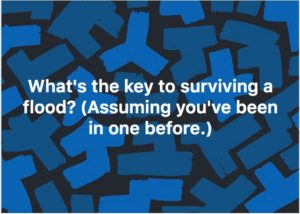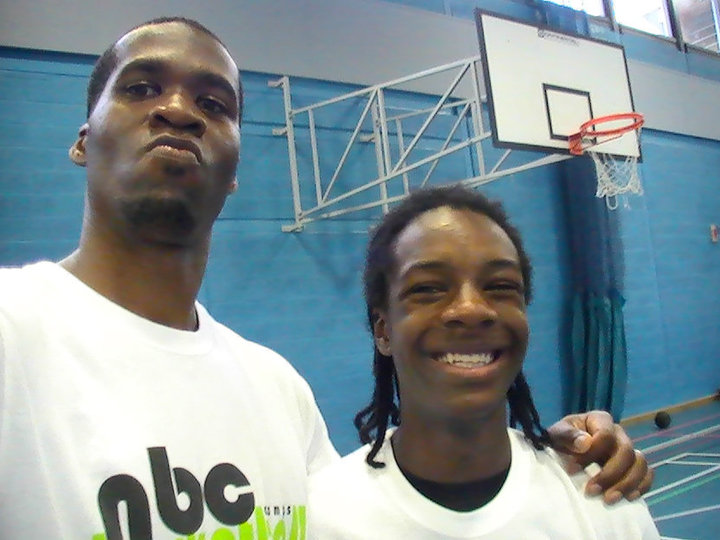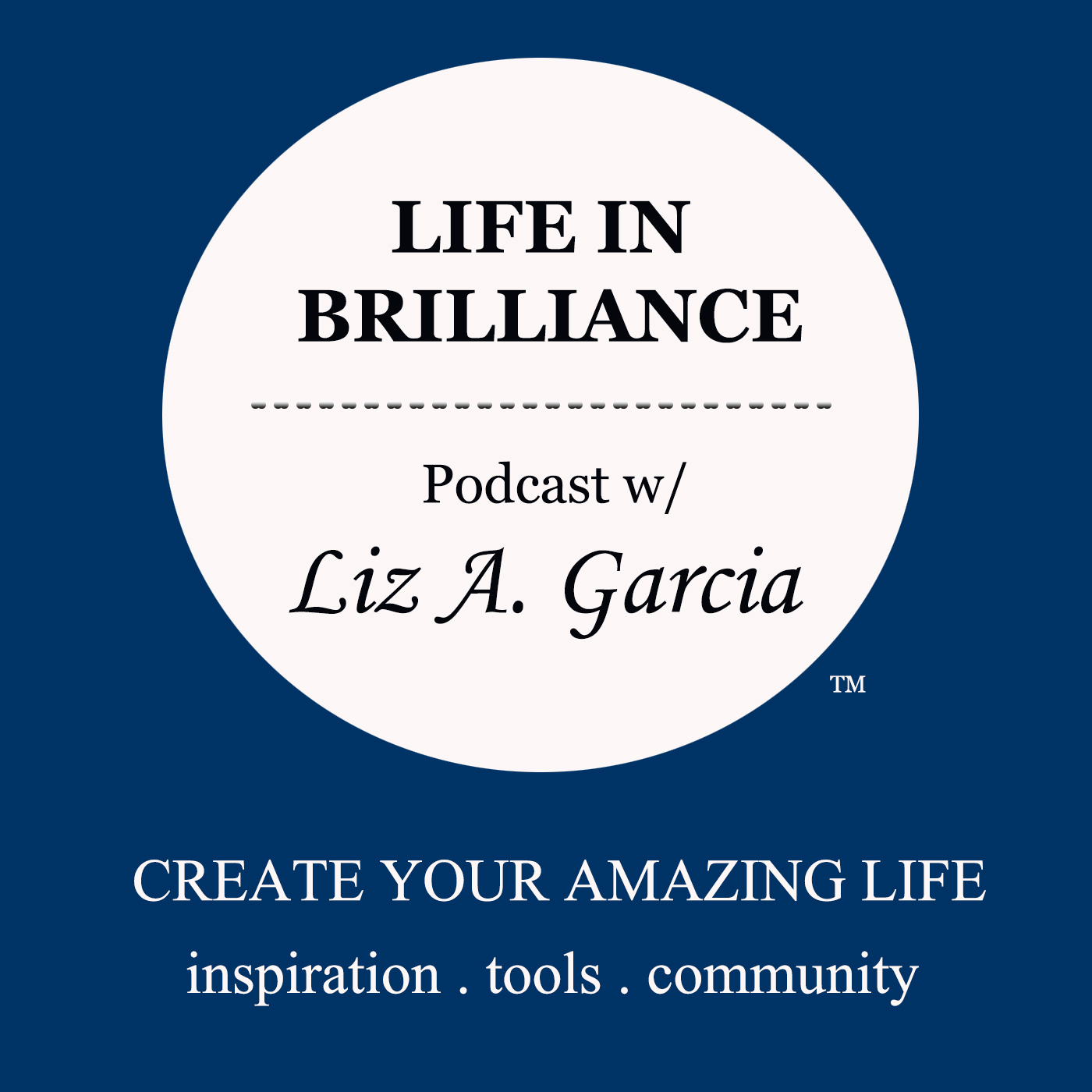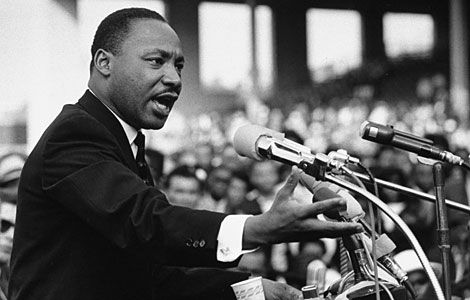Floods are among the most devastating phenomena on the planet occurring as a the result of super storms and breaches in water containment structures. They are indiscriminate overtaking anything in their path including humans. Of course, as I write this, the sky is a deep blue serving as the backdrop to Jacaranda leaves without their purple blooms this time of year. Real weather is foreign to me, a California wimp who ain’t ever been in cold much below 29 degrees Fahrenheit. I’ve also never experienced a literal flood so I asked some friends this morning how you survive one.
The word “flood” has a negative charge in my brain for some reason. Maybe it’s because uncontrolled amounts of water make a brother nervous. I got caught in a riptide once, which isn’t a flood, but almost drowning leaves an emotional scar. So, when I think of a flood I visualize water in total control, unbridled and powerful beyond imagination, moving the heaviest things as though they were hollow on the inside. So I began to wonder about other kinds of floods, the figurative ones – mental, spiritual and emotional – in the world of teenagers.
Is depression anything less than a flood of hopelessness? How about cynicism, the outlook that reflects skepticism about most everything and naturally doubts all things good and optimistic. Is that a flood? Or what about hysteria – that feeling when fear consumes everything in you and puts you in a hellish panic. We could say this constitutes a flood too right? I forgot about judgmentalism or the way we judge others with attention to their worst details. It wouldn’t be hard to make a case that Americans are in a flood that is undeniable and teens are the ones I see most incapable of treading water.
SURVIVING A LITERAL FLOOD
Some wise assed friends, all of whom I deeply respect, commented to my initial post on Facebook:

The first three responses were: 1) An ark 2) Air and 3) Hold your breath. So I posted that I wasn’t being facetious and I got less comical, more robust responses. A fellow teacher and overall gifted dude from San Bernardino County California said,
“Get to high ground. Focus on basic human needs for water and warmth. Get clean and dry asap. When the water subsides you will be looking at trashing anything the floodwater touched, cut out all the drywall to a few inches above the waterline and trash all carpet and insulation to get the house to dry out. Spray studs with bleach water to avoid mold. Once dry, rebuild.”
Man!!!! I couldn’t help but wonder what this looks like for non-literal flooding. Could a person follow these steps when flooded by depression, cynicism, hysteria or condemning judgement? The parallels were firing like a pirate ship’s cannons as I considered the congruity. 1. Getting to higher ground 2. Prioritizing basic human needs for water and warmth 3. Getting clean and dry 4. Sanitizing your environment of toxicity 5. Rebuilding.
For high school students today born between 1999 and 2002, there is a flood and it consists of magnified negativity, pretense, cheating, dangerous hedonism and apathy. But just as floods can’t occur everywhere at the same time, it is also true that future adults shouldn’t be undereducated about survival in the event they find themselves flooded. The flood waters are not all that exists but in an emergency sometimes the flood waters are all they can see.
A fraternity brother of mine offered that a person can increase his/her chances of survival during a flood by, “[making] use of flotation devices such as coolers, plastic jugs…keep[ing] a flotation vest on or easily [within] reach” while another philanthropist friend of mine simply said survival depends on “preparation.”
The more people commented the more I was convinced that floods don’t just threaten the here-and-now. They threaten the future. Surviving a flood requires quick thinking and a willingness to let go of unnecessary things no matter how important they once were. Then going forward, there is a cleansing that you have to be intentional about in order to not suffer from the after affects of the flood. Another teaching colleague and father of a police officer submitted this genius,
Focus on what you have with you and what is still working. Like a fighter pilot who has to bail out of his plane and survive, take stock/inventory of what you have and what works. In a disaster, you can’t worry about what you don’t have or have lost, just need to focus on what you can work with.
One of the best recommendations came from a colleague who wrote for the student newspaper with me at Chapman University back in the day. Profoundly she said, “Ask for help.” And that might actually be the flotation device most missing from the emergency kit of would-be flood survivors.
A dear life veteran posted this, “We were in a car when a flash flood hit. The words of the day [were] “keep moving.”
MENTAL, SPIRITUAL AND EMOTIONAL FLOODS: TEEN EDITION
Here’s what I see in 14-18 year-olds in my world. They’re thankful but distracted, hopeful but unaccustomed to failure, talented but untested and therefore grossly amateurish and a wee bit soft skinned. Life isn’t happening in some kind of slow progression away from childhood. It’s a flood to them and they have learned false coping mechanisms like cheating, self-harming, having two identities for family and school and avoiding confrontation.
Most of them want to be better but don’t know where to begin. It is a flood they’re in after all. There’s this underworld of social pressure/social media pressure, academic pressure, parental pressure and self pressure. Their flood is not our flood (“Our” referring to adults 30+). I’m with them everyday and they are fairly transparent folk but they are offered lectures when really they need a “How-to” plan for survival. They are bored with the analogies and comparisons that we hope will negatively light a fire under ’em. The old wineskins of “I’m just trying to keep you from making the same mistakes I did” are officially decomposed because preaching doesn’t save the lost; active mentoring does. As the Nigerian proverb says, “Fine words do not produce food.” They’re drowning and absolutely surprised when anyone asks them about they’re knowledge of getting out of this disaster and transitioning into an adult. To them, very few adults really care.
Teens & Mental Floods
I find that most students are quick witted these days and don’t need a lot of bread crumbs if they’re interested and connected to a topic. The constant posting online, harvesting of memes and hunting for funny vids to pass the time have made teens far more sophisticated. Simply put, these kids are hella smart and know good humor when they hear it. Tell a good story, and phones disappear. Their stares are worth a thousand words as they parse how their English teacher managed to avoid being forced to join a local Crip set (gang) in the inner city of Los Angeles. They can and do think at high levels when engaged and allowed to offer original thoughts but they’re always thinking and/or stimulating their brains with information, contentious relationships or the results of procrastination. Consequently, they’re flat out fatigued on any given day unless they’re having fun with friends. In fact, add to fun the support they feel from their peer relationships. You do realize that when their phones are out in class they’re Snapchatting each other right?
Mentally they are flooded and higher ground might very well be learning how to make time for silence. Of course, escaping mental floods requires that we parents, teachers, coaches, adults, etc… reduce the noise we are producing and allowing into our own lives. Mentally flooded adults are cloning themselves but “no shade” as the young people say. I’m not judging. I’m saying that we all need higher ground. Acknowledgement is the key but therein lies the problem. I know when water is rising so high that I might drown but sometimes the student can’t see that circumstances are the flood waters and that living in a flood is no way to live at all. Mentally, these kids often think they’re invincible and attempt the impossible while ill equipped, effectively drowning. That’s what they see us do so they replicate. I’ll save my ideas on how to counter this for the end.
Teens & Spiritual Floods
Students ebb on a spectrum between being complete materialists only concerned with today’s entertainment and the deep contemplative person trying to align his/her core spiritual beliefs with an imperfect world. Kids face great dangers in these flood waters because they don’t know if they can ask for help in discerning the most neglected part of themselves.
Specific to my own native Christian Faith, churches have struggled to model transparency and humanness when it comes to reconciling failure with grace and the cycle of becoming whole. Teens are hard on themselves and they can’t love their neighbor because they already hate themselves. Mentors (clergy, parents, spiritual community members) are the higher ground but they are in short supply as adults issue mandates without selflessly offering themselves as real-life examples of what it means to be in the undulation of the troubled human experience.
Teens think very literally and struggle with the abstract so avoiding bad behavior equals holiness to them. For many of them, their spirituality is nothing more than prudish religious elitism which makes them either prime for a prideful fall or classification as unrighteous. Teens are flooded with notions that God has a political affiliation and a soft spot for Americans. Teens aspire to change the world while being told to wait until they are financially secure. They are interested in learning to love, serve, lead self & others but are flooded by the pressure of it all because of the absence many of them experience.
Teens think about what will happen to them if they die while having sex with their girl/boyfriend. They think about the inability to cease pornography or more mildly simply speak up to a friend who is making destructive choices. Teens wonder if God watches this world. They wonder if there is a God at all because the world’s narrative and the Church’s directives ironically do not offer adequate evacuation procedures to higher ground.
Teens & Emotional Floods
Elation, fear, anxiety, apprehension, disappointment, sadness, hopefulness, anticipation and confusion are among the many emotions in the range of a teen’s day. I could probably drop the mic here but it is worth mentioning that our culture is greatly influenced by hormones. Feelings matter more than they ever have as social media presence has evolved into an art in just 10 years. If it didn’t get posted, it didn’t happen. Even without social media, teens are emotionally driven on the road to adulthood. But just because it is natural for teens to have their emotional state in disarray does not mean it’s comfortable.
I have to read the room to be a teacher. Every period is different in the high school world and collectively, the kids produce a vibe. I poll the classes almost daily to see how they feel about the previous period, the next period’s quiz, the stuff from home, the stuff from each other. Sometimes I even invite them into some deep breathing to bring themselves completely into the classroom. I know that I can’t teach if students are emotionally absent. So I might say,
“I know your phone is your escape because no one wants to be here and there’s no crime in that. That’s real. There is comfort in your friends. I find comfort in mine. But what if we aren’t strangers today? Why can’t we be friends like “WAR” used to sing? (laughter) I mean I know three beaches I would rather be at but today we’re reading C.S. Lewis’ Screwtape Letters and in this story, a demon is teaching another demon to prey on humans. Crazy right? You ever seen one…I mean a real demon? How do movies characterize demons? Why are we obsessed with paranormal stuff? Do you sometimes feel like a demon has been assigned to your life?…
Somewhere between all of the emotions is an impressionable person still blank enough to desire help. Floods make you desperate and teens are still desperate for rescue.
First Responders
In all of the advice about surviving floods, most of the onus fell to the flood victim. I get it. Advocating for yourself by having a plan, reaching out for help, ending corrosive relationships, etc. is all well and good. But I’ve never seen someone in a news broadcast who is actually trapped by flood waters escape without first responders. Rafts, helicopters, fast-water rescuers, etc. do what only they can do to save lives every year. The metaphor you smell is that first responders are parents, neighbors, teachers, school administrators, coaches, religious leaders, guardians etc. who understand that rescuing is an aggressively intentional endeavor.
Rescuing a “flood” victim requires us to commit first to our own rescue. As long as we are flooded mentally, spiritually and emotionally we are not at higher ground. We are being dragged by life because of fear and a host of other emotions. I have learned and am learning to ask for help so I can be help myself. Here was some advice I sought from a seasoned counselor and behavioral expert about what cuts off depression before it sets in:
“Symptoms are different for everyone but lack of motivation and concentration is definitely one… Depression is a place where you can get stuck if you don’t keep moving forward. Then it becomes chronic and clinical help and medication would be necessary…”
She went on to recommend B vitamins, herb mixtures as well as exercising, sleeping, and eating right. She added that silence and journaling are almost necessities and that it was a good idea to make a list everyday of three things you want to accomplish and do them.
At day’s end my interest in surviving a flood yielded some simple helps that most of us already know. To rescue a “flood” victim, namely a child/teen, you have to touch the victim, risk something, be vulnerable, release fixed expectations and put your money and mouth in the same place. Oh…but take care of you first or at least at the same time so you’re not being a hypocrite. Flooding eventually subsides but not until it has wreaked absolute havoc.
I have three rules in my class that I believe can be transferred to other environments:
- Let’s all do everything we can to go home healthier than we arrived.
- Let’s learn something about one another and the topic that will change our world.
- Let’s be awkward and imperfect together.
- Let’s be honest about what is keeping us from 1, 2 and 3.

 goes without saying that repeating yourself is annoying. But the mentors of a society are always forced to wait on novices. The neophytes we attempt to initiate into the “village” require us to teach, to wait, to teach again, correct, love and build that we might unleash fully formed humans.
goes without saying that repeating yourself is annoying. But the mentors of a society are always forced to wait on novices. The neophytes we attempt to initiate into the “village” require us to teach, to wait, to teach again, correct, love and build that we might unleash fully formed humans. I was talking to a varsity basketball team recently about identity, the quality of being oneself and not another. And every time I read that definition of identity, I’m confronted with the question of how we learn to be the truest version of ourselves and not some false version. The guys I met with recently ranged in age between 15-18 and so I led the lunchtime session with this question:
I was talking to a varsity basketball team recently about identity, the quality of being oneself and not another. And every time I read that definition of identity, I’m confronted with the question of how we learn to be the truest version of ourselves and not some false version. The guys I met with recently ranged in age between 15-18 and so I led the lunchtime session with this question:




